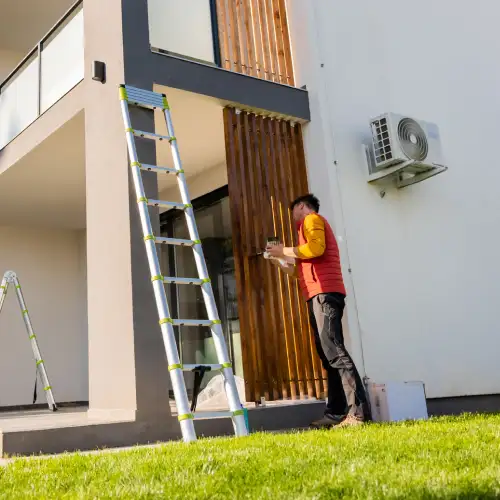Major issues commonly found during home inspections
Even homes with major curb appeal can be hiding some sneaky surprises, and the current owners may not even be aware. So, your Realtor and the home inspector can help you determine what fixes are mandatory from the home inspection report. Here are some common issues that often require discussion:
Broken HVAC system
Discovering a broken HVAC during inspection can feel like the engine light flashing in your new car. Yes, it's a big deal and you’re right to be concerned. After all, HVAC systems keep temperatures stable through the seasons. Replacing or repairing them can be costly. If this issue arises, it’s a strong card to play during negotiations.
Faulty wiring
Faulty wiring isn’t just a nuisance; it’s a fire waiting to happen. But don’t panic just yet. Just put this issue at the top of your list when negotiating repairs with the seller. Electrical systems are complex and fixing them can be expensive, but it’s crucial to handle these repairs promptly and professionally.
Unwanted pests
Termites and spiders and moths, oh my! Did you know they’re called carpenter ants because they borrow wood from your house to build their own? (Yikes!) Homeowners and Realtors know that pests can cause serious damage if left unaddressed. Discovering pests during a home inspection can be unsettling, but it doesn’t have to be a dealbreaker. Get this issue resolved before you buy so that moving day is smooth sailing.
Cracked or broken windows & doors
A coat with holes won’t keep you very warm in the winter. The same goes for drafty windows and doors. These issues go far beyond aesthetics. Drafts and gaps can really do a number on your energy bills. For the sake of your comfort––and your monthly budget––make sure doors and windows are doing their job.
Radon
Radon is the silent guest you never want in your home. This colorless, odorless gas occurs naturally from uranium in the soil and can go unnoticed without proper testing. It can enter through cracks and accumulate to high levels, posing significant health risks. Addressing radon issues is of utmost importance for ensuring a healthy home.
What repairs should I waive in a home inspection negotiation?
Taking care of major issues first means you can start enjoying your new home safely from day one. Always consult your home inspector and Realtor on what (if any) repairs could be waived.
Understanding major vs minor repairs
Example of major repairs:
| Repair Type | Description | |
|---|---|---|
| Roof Damage | Significant wear, leaks or missing shingles requiring extensive repair or replacement. | |
| Foundation Issues | Cracks, structural problems and/or mold that compromise the integrity of the home. | |
| HVAC System Failure | Complete breakdown or significant issues requiring major repair or full replacement. | |
| Plumbing Problems | Major leaks, sewage issues or systemic problems requiring extensive repairs. | |
| Electrical System Non-Compliance | Outdated wiring or panels that do not meet current codes and require a full upgrade. |
Examples of minor repairs:
| Repair Type | Description | |
|---|---|---|
| Cosmetic Flaws | Minor cracks in walls or scuffs that can be easily fixed or painted over. | |
| Loose Fixtures | Handles, doorknobs or cabinet pulls that need tightening or replacement. | |
| Minor Electrical Issues | Faulty switches or outlets that require simple repairs. | |
| Worn Carpet or Flooring | Surface wear that can be lived with temporarily or replaced at a relatively low cost. | |
| Leaky Faucets | Minor drips or leaks in faucets that can typically be fixed with new washers or simple adjustments. |
How to plan for a home inspection negotiation
Ready, set, prep. When gearing up for negotiation day, set a game plan, know your must-haves and think of it in terms of a win-win. We’ll help you get started.
Review the inspection report with your real estate agent
Sit down with your agent and go through the inspection report with a fine-tooth comb. You need to know what the serious and material issues are; it’s important to understand what every crack and crevice in your potential new home means.
Prioritize the repairs
Not all repairs are created equal. It may be best to prioritize them as you would your shopping list: essentials first with the understanding that major structural issues trump minor cosmetic fixes.
Use your home inspection contingency
As with all contingencies, these act as your safety net should things go awry. With a home inspection contingency in place (nice call, by the way), you can back out. Remember get-out-of-jail-free cards? You’ve got one in your back pocket. If you reach a point in the agreement where the repairs cannot be made you can always use this contingency to cancel the purchase agreement.
Tips for negotiating after a home inspection
Feeling ready for the negotiation table? Awesome. Here are ten tips to get you closer to “Home, Sweet Home.”
- Hire an experienced agent
Having a seasoned Realtor by your side can make a big difference. They’re the skilled navigators who can steer you smoothly through the often choppy waters of home buying negotiations. Instead of guessing what’s reasonable to ask for after a home inspection, you’ll know for sure with their help. - Understand the market
Before you start requesting repairs after a home inspection, take a moment to feel out the market. A Realtor may caution you about being too demanding with your repair requests because the real estate market is a seller’s market, meaning they can allow you to cancel the agreement under the contingency clause and quickly find a less demanding buyer. - Prioritize major repairs
Remember, it’s not about scuffed paint. It’s about roof leaks. Focus on the biggies like safety, functionality and structural integrity—think HVAC systems, roofing, electrical and plumbing problems. - Ask for a discount
If the inspection shows some serious big-ticket repairs, the seller may agree to drop the price. If you score a discount, you have the freedom to fix things up on your own terms later. In this case, you will need to have sufficient non-mortgage cash reserves on hand to cover the repairs. Remember, negotiating a house price after inspection is perfectly fine and helps everyone know where they stand. - Consider a credit
A seller may also provide you with a credit or allowance in which they place money with the closing agent that goes to you for you to cover the cost of the repairs. Letting the seller off the hook can sometimes simplify negotiations and allow you to manage the repairs according to your own standards post-purchase. - Think long term
When considering repairs, think about how they’ll impact your life down the road. Remember, buying a home is more than just a transaction; it's a long-term investment in your future. Ensuring it's in top shape now can save you headaches and extra costs later. - Show proof
Come armed with detailed estimates and reports when it’s time to negotiate. This not only shows that you're serious and well-informed but also strengthens your position at the negotiating table by backing up your requests with data. - Ask for a home warranty
A home warranty is a service you can buy that covers just about everything—your appliances, heating, air conditioning, even your sprinkler system! If something goes kaput after you've settled in, the warranty company swoops in to fix it, often at little or no cost to you. You can snag this warranty yourself, but sometimes the seller might cover the cost of the first year as a sweetener. This can be a valuable safety net that continues to provide coverage after you move in. A warranty can cover unexpected issues that pop up after you settle in, giving you extra peace of mind as you start this new chapter. - Keep your cool
Maintain a level head—easier said than done, we know! Emotions can spike and worries can overwhelm, but striving for mutual satisfaction is always ideal. Approach negotiations with a spirit of cooperation. It’s about making the home safe and livable, not getting the upper hand. - Compromise
Finally, come to the table prepared to give a little. You might not get everything on your wish list, but focusing on what’s most important will help you achieve your goal: owning a home that’s safe, comfortable and worth every penny.
Navigating the home inspection process can be tricky, but once you’re in the know you can make it through unscathed and even a bit wiser.







